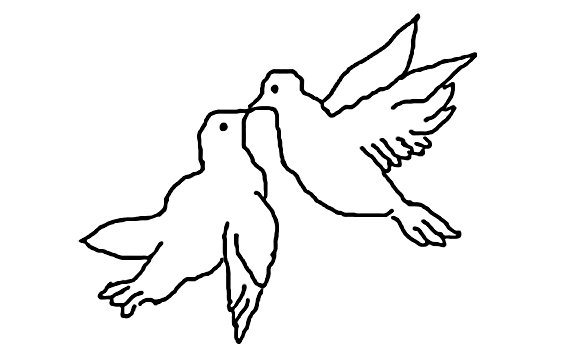 |
Cooloring.com |
If music be the food of love, play on.
Give me excess of it that, surfeiting,
The appetite may sicken, and so die.
~ Shakespeare, Twelfth Night, Act I sc i
How peace turns upside down
until this night’s Epiphany,
when music shows its reason and
Lord of Misrule ends his season.
If music be the food
of love,
play on, calls
Orsino in pain
who loves his Viola in vain
too much, too little to be sane.
Yet music feeds a greater love
than daily truth allows, admits
pathways of possibility
beyond human mortality.
Before the Comedy can end
Shakespeare allows his characters
to see their folly and enter
sober into Love’s deep center.
That’s where harmony turns the spheres,
celestial tunes play without end,
false lust transforms into kindness,
and peace and justice start to dance.
And off the stage that mirrors us
we have this chance again to hum
remembered hymns af Joy and Love
and right the wrongs that caged the dove.
For Sumana's
Poets United Midweek Motif ~ Music
Inspired by Parker Palmer's Bringing Christmas Back Down to Earth
and by this song:
My blog poems are rough drafts.
Please respect my copyright.
Please respect my copyright.
© 2016 Susan L. Chast
false lust transforms into kindness,
ReplyDeleteand peace and justice start to dance.
If only peace and justice can act in tandem the world is a great place to be in
Hank
I love that music "admits pathways of possibility". It is no wonder that people on protest lines sing songs together, to shore up their spirits. I LOVE when "peace and justice start to dance." May they begin soon.
ReplyDeleteSuch a profound serving on music; my favourite lines
ReplyDelete"Yet music feeds a greater love
than daily truth allows, admits"
Thanks for the video, I luvved it gonna share it too
much love...
Oh Susan how beautifully you respond to Shakespeare. May the music of peace and justice play loudly so all can hear.
ReplyDelete(Thank you for your comment on my blog. Of course you can share my poem. It's an honor.
Right the wrongs that caged the dove...indeed!
ReplyDeleteI am pleased you used the Shakespeare quote. You have constructed a wonderful poem inspired by it.
Caught in that ending - "we have this chance again to hum"
ReplyDeleteAs good as this is, that one line took me away
love the shakespeare reference, woven so beautifully into your message.
ReplyDeleteWell I loved this--If Music Be the Food of Love is one of my favorites--and Purcell (among others) composed some beautiful settings of this text--
ReplyDeleteI teach them often--I am sorry that I missed this prompt--but your piece is wonderful!
I love where this poem goes, and the beautiful language it uses to get there.
ReplyDeleteIt is a lovely place where peace and justice can dance. Beautiful!
ReplyDeleteah...every word of the poem is coming from love's deep center that the world so direly needs today...every line is my favorite...
ReplyDeleteYet music feeds a greater love
ReplyDeletethan daily truth allows, admits
pathways of possibility
beyond human mortality.
Gorgeously penned, Susan❤️ I am sure Shakespeare must be smiling right now❤️
A wise reading of a very deep comedy, the serious business of Love and the bars we must get through to free the dove (perfect final line). The real tragedy is that we're all such fools at love. Great stuff, Susan.
ReplyDeleteI can't claim to understand Shakespeare but peace and justice seem like the very best roots for music and joy
ReplyDeleteSusan this is a very good one! I loved reading it, seems to be perfect for the season! I am touched by, "love's deep center."
ReplyDeleteOh I do hope that the lord of misrule will soon end his season.... Waiting for the curtain of his stage to go down.
ReplyDeleteWe need to bring on that dance of peace and justice, the dance that seems to have gotten lost, and hopefully we can all sing hymns of joy and love and mean them....as we celebrate peace on earth good well to all!
Thanks for sharing such a nice content. Your post was really good. Some ideas can be made. About English literature. Further, you can access this site to learn more about Shakespeare’s Use of Disguise in The Twelfth Night
ReplyDelete